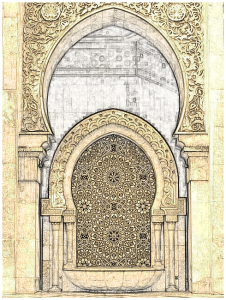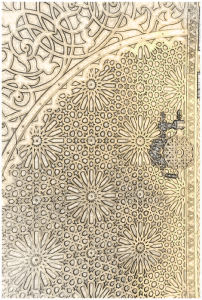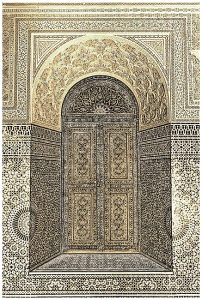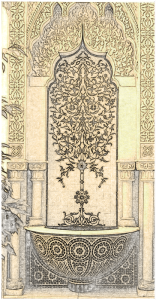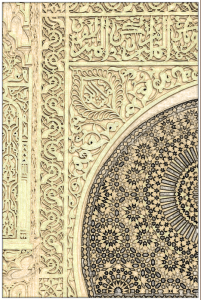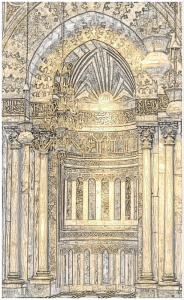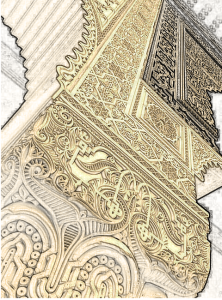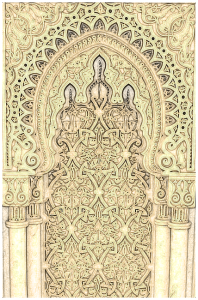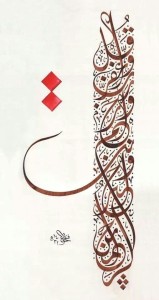The End Of The Universe Events On The Day of Judgment
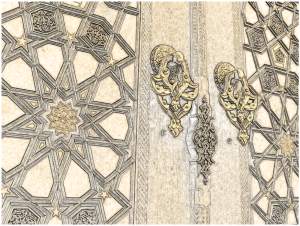 Abu Hurairah said that, while the Messenger of Allah was among a group of his companions, he said, “Indeed, when Allah finished creating the heavens and the earth, He created the horn (Trumpet) and gave it to Israafeel. He holds it on his mouth, looking at the ‘Arsh (Throne) with his sight, waiting for when he will be ordered.” Abu Hurairah asked, “O Messenger of Allah, and what is As-Soor?” He said, “A horn.” “And what is it like?” He said, “Huge. And by the One Who has sent me by the truth, the greatness of the circle of his mouth is like the width of the heavens and the earth. He will blow into it three times: the first is the blowing of terror; the second is the blowing of swooning away; and the third is the blowing of resurrection to the Lord of all that exists. Allah will order Israafeel to make the first blowing, saying, ‘Blow the blowing of terror’ The inhabitants of the heavens and the earth will be terrified except for whomsoever Allah pleases. Allah will order him, and then he will extend it and prolong it without getting tired. This blowing is the one about which Allah said:
Abu Hurairah said that, while the Messenger of Allah was among a group of his companions, he said, “Indeed, when Allah finished creating the heavens and the earth, He created the horn (Trumpet) and gave it to Israafeel. He holds it on his mouth, looking at the ‘Arsh (Throne) with his sight, waiting for when he will be ordered.” Abu Hurairah asked, “O Messenger of Allah, and what is As-Soor?” He said, “A horn.” “And what is it like?” He said, “Huge. And by the One Who has sent me by the truth, the greatness of the circle of his mouth is like the width of the heavens and the earth. He will blow into it three times: the first is the blowing of terror; the second is the blowing of swooning away; and the third is the blowing of resurrection to the Lord of all that exists. Allah will order Israafeel to make the first blowing, saying, ‘Blow the blowing of terror’ The inhabitants of the heavens and the earth will be terrified except for whomsoever Allah pleases. Allah will order him, and then he will extend it and prolong it without getting tired. This blowing is the one about which Allah said:
“And these only wait for a single Siahah (shout (i.e. the blowing of the Trumpet by the angel Israafeel or Sarafeel)) there will be no pause or ending thereto (till everything will perish except Allah)” (38:15)
“The mountains will move like clouds, and they will be (like a) mirage (the bonds of matter weakening in front of our eyes as solid matter wavers and slowly disintegrates). The earth will shake its inhabitants, and it will be like a ship at sea, and the waves are striking it; it will capsize its inhabitants like a lamp suspended from a throne (the earth floating in space as gravity looses it’s effect). It will shake the souls. Lo! It is the one about which Allah said:
“On the Day (when the first blowing of the Trumpet is blown), the earth and the mountains will shake violently (and everybody will die), the second blowing of the Trumpet follows it (and everybody will be raised up), (some) hearts that Day will shake with fear and anxiety.” (79:7-6)
The earth will shake with its inhabitants; every nursing mother will forget her nursling and every pregnant one will drop her load. Children will turn gray-haired, and people will fly (run), fleeing from the terror. The angels will meet them, striking them on their faces, and they will return. Then they turn around, running away. They will have no protector from Allah. Some of them will call the others, and while they are upon that state, the earth will split into two cracks, from one region to another. Then they will see a tremendous matter, never having seen before something similar to it. And for that they will fall into such a state of terror and grief that only Allah has full knowledge thereof. They will look at the sky, and it will be like the boiling filth of oil, (or molten copper or brass, meaning the colors present in space will be awash like different kinds of paint mix in water). Then the sky will be cleft asunder and the stars will be scattered. The sun and its moon will be eclipsed.” The Messenger of Allah said, “The dead will know nothing of that.”
Abu Hurairah said, “As for those whom Allah exempted when He said, ‘and all who are in the heavens and all who are on the earth, will be terrified except him whom Allah will (exempt); they are the martyrs. The terror reaches only those who are alive, and the martyrs are alive with their Lord, and they are being given provision. Allah will protect them from the terror of that day, making them safe. It will be a punishment from Allah that he will send upon the worst of the creation. About this terror, Allah said:
“O mankind! Fear your Lord and be dutiful to Him! Verily, the earthquake of the Hour (of Judgment) is a terrible thing. The Day you shall see it, every nursing mother will forget her nursling, and every pregnant one will drop her load, and you shall see mankind as in a drunken state, yet they will not be drunken, but severe will be the Torment of Allah.”
“They will remain in that state of punishment for a period that Allah wills; and it will be prolonged. Then Allah will order Israafeel to blow the blowing of the swooning away. Except for those whom Allah wills, the inhabitants of the heavens and the earth will swoon away. And they will be silent (dead, destroyed). The angel of death will go to the All-Mighty and say, ‘O my Lord, other than those whom You exempted, the inhabitants of the heavens and the earth are dead.’ He will say, and He is most knowledgeable regarding who remains, ‘And who is left.’ The angel will say, ‘O my Lord, You, the Ever-Living, Who never dies, remains. The bearers of Your throne remain; Jibreel and Mikaaeel (Michael) remain; and I remain.’ Allah says, ‘Let Jibreel and Mikaaeel die.’ Then Allah will make His Throne speak, and it will say, ‘O my Lord, Jibreel and Mikaaeel will die?’ Allah will say, ‘Be quiet, for I have indeed written death upon everyone who is under my Throne.’ And so the two said angels die. Then the Angel of death goes to the All-Mighty ‘Azza Wa-Jall (to Whom belongs Might and Majesty), and says, ‘O my Lord, Jibreel and Mikaaeel have indeed died. I and the bearers of the throne are left.’ Allah will say, ‘Then let the bearers of the throne die,’ and then they will die. And Allah will order the throne, and it will seize the horn from Israafeel. Then the angel of death will go to the All-Mighty and say, “O my Lord, the bearers of Your throne have indeed died.’ He will say, and He is most knowledgeable regarding who remains, ‘Then who is left?’ He will say, ‘O my Lord, You, the Ever-Living, Who never dies remains, and I remain.’ Allah will say, ‘You are one from my creation; I have created you for what you have seen, so die, and he will die.
When no one remains except for Allah, the One, the Irresistible, the single Self-Sufficient Master: He begets not, nor was He begotten. And there is none co-equal or comparable unto Him. He will be the last just as He was the first. He will fold the heavens and the earth like the folding of the registry for a book. Then he will spread them and then wrap them three times. He will say, ‘I am the All-Mighty (Al-Jabbaar),’ three times. Then He will call with His voice, ‘Whose is the kingdom this Day?’ He will call out (with this question) three times, and no one will answer Him. He will say to Himself, ‘It is Allah’s, the One, the Irresistible!’ The earth will be changed to another earth and so will be the heavens. Then He will unfold, even out, spread, and then extend it, like the extending of tanned leather… You will see therein nothing crooked or curved. Then Allah will drive out the creation with one driving, and they will be like they were the first time: whoever was inside of it will be inside of it, and whoever was on it will be on it.
[The phrase “in it” is a reference to creatures in physical space like man and animals, if we can imagine the physical stuff in the Universe like planets, rocks, trees is made from matter larger than Atoms, this is what is meant by “in the Universe”. The physical Universe is surrounded by the non physical particles smaller than Atoms, in all directions, so “on it” refers to, on top of physical matter and all the small particles that fly through everything solid, it is what “on it” means, the prophet (saws) was talking about the quantum universe and it’s creatures like the Jinn and Angels which are made from these small particles like photons (light). The term on it may be the translators choice of words, but this is the perspective of the heavens, they look down upon the physical world. It should be understood that the prophet (saws) saw the entire Universe which is what is being described in this narration in a language desert Arabs can understand, and we shouldn’t mistake His words for simple explanations because if we gather all that He said about the Universe, including what is in the Quran this negates any simpleton understanding of His words. It takes a high level intellect to be capable of discussing all the complex topics mentioned in the Quran in simple terms everyone can understand].Then Allah will send water from underneath the Throne on you. Then Allah will order the sky to give rain, and it will rain for forty days, until the water will be above them by 12 arm-spans. Then Allah will order bodies to grow (underneath the ground), and they will grow like the growing of vegetables (the resurrection of bodies with out souls), until their bodies will be complete, becoming as they were. Allah will say, ‘Let Jibreel and Mikaaeel live,’ and they will come back to life. Then Allah will call the souls. They will be brought, and they will be shining: the souls of the Muslims (believers in Allah) are light; and the (souls of the) others (not destined to Jannah) are dark. He will seize them all and throw them into the horn (Trumpet). Then Allah will order Israafeel to blow the blowing of resurrection, and he will blow the blowing of resurrection. The souls will come out as if they are bees; they will have filled what is between the heavens and the earth. Allah will say, ‘By My Greatness and Majesty, each soul will indeed return to its body. The souls will enter the earth to the bodies, and they will enter into the noses, moving in the body like poison in a poisonous (creature). Then the earth will split (open) for you, and I am the first for whom the earth will split (open). You will come out in a hurry, going quickly to your Lord:
“Hastening towards the caller, the disbelievers will say: “This is a hard Day.” (54:8)
“You will be barefooted, naked, Ghulfan Ghurlan (uncircumcised). Then you will stand in one place of standing for a period of seventy years, and you will not be looked at. Nor will any judgment be passed between you. Then you will cry until your tears are depleted.
Then you will cry blood and you will sweat, until that (sweat) bridles you (i.e., reaches your faces, just as a bridle does for a horse) or it will reach the chins (of some). Then you will shout, saying, ‘Who will intercede for us to our Lord, so that He judges between us?’ They will say, ‘Who is more worthy of that than your father, Adam. Allah created him with His Hand, and He blew into him from His Rooh, and He spoke to him Qublan.’ They will go to Adam and request that from him, but he will refuse… Then they will go to the Prophets, one Prophet at a time. Each time they go to a Prophet, he will refuse them.”
The Messenger of Allah said, “Until you come to me, and I will go until I reach Al-Fahs, where I will fall down, prostrating.” Abu Hurairah said, “O Messenger of Allah, what is Al-Fahs?” He said, “A place before the Throne; until Allah sends an angel to me, who will take me by my upper arm. He will raise me and say to me, ‘O Muhammad.’ I will say (to Allah), ‘Yes, I am answering your call, O my Lord.’ Allah will say, ‘What is your affair?’ – and He is Most Knowledgeable thereof. I will say, ‘O my Lord, You promised me intercession, so allow me to intercede for Your creation – so judge between them.’ He ‘will say, ‘I have granted you intercession. I am coming to you all and I will judge among you.”‘
The Messenger of Allah said, “I will then return and stand with the people. As we are standing, we will hear a powerful sound from the sky. The inhabitants of the heaven and of the earth will descend, (in number) like those who are on earth from jinn and mankind. When they come near to the earth, the earth will shine with their light. And they will take their places in rows. We will say to them, ‘Is our Lord among you.’ They will say, ‘No, He is coming.’…Until the All- Mighty – Blessed is He, The Exalted – will come in the shadows of the clouds and the angels (Allah will allow a direction to be perceived on that day, their is no risk as this time of confusing His nature with created things and the judgment would have begun). At that time, eight will carry His Throne; and today they are four… Then Allah will call out with His voice, saying, ‘O group of jinn and mankind; indeed, I have listened to you from the day you were created until this day of yours: I have listened to your speech and seen your deeds, so listen to Me. Verily, it is only your deeds and your scrolls that are read out to you.
Whosoever finds goodness then let him praise Allah. And whosoever finds otherwise, then let him blame no one except himself. Then Allah will order the Hellfire, and a manifest dark neck will come out from it. Then He will say:
And O you Al-Mujrimoon (criminals, polytheists, sinners, disbelievers in the Islam, wicked evil ones, etc.)! Get you apart this day (from the believers)” (36:59)
“Did I not ordain for you, O Children of Adam, that you should not worship Shaitan (Satan). Verily, he is a plain enemy to you. And that you should worship Me (Alone, and set up not rivals, associate-gods with Me). That is a Straight Path and indeed he (Satan) did lead astray a great multitude of you. Did you not, then, understand? This is Hell which you were promised! Burn therein this Day, for that you used to disbelieve.”(36:60-64)
“Allah will separate the people, making each group distinct. He we will call the nations, calling each nation to its Book. And the nations will be kneeling from the terror (of the situation). Allah said:
“And you will see each nation humbled to their knees (kneeling), each nation will be called to its Record (of deeds). This Day you shall be recompensed for what you used to do.” (45:28)
“Then Allah will rule between the creation except for Ath-Thaqalain: mankind and jinn. Allah will rule between wild beasts and animals, to the degree that the hornless animal will exact retribution from the horned one (that attacked it).
When Allah finishes that, and there remains no liability upon anyone else (from other than jinn and mankind), Allah will say to them (to beasts and animals): ‘Be you all dust.’ At that juncture, the disbeliever will say, ‘Would that I were dust.’ Then Allah will rule between (His) slaves, and the first matter that will be ruled upon will be (issues of) blood (these are examples of what will occur, not the sum of everything that will occur). Everyone who was killed in the way of Allah will come, and Allah will command the one who killed (justly), and he will carry his head (i.e. the head of the one who was killed); (blood) will be coming out from its veins. He will say, ‘My Lord, for what did this one kill me?’ Allah will say, and He knows best, ‘For what did you kill him?’ He will say, ‘O my Lord, I killed him so that the Glory be Yours.’ Allah will say, ‘You have spoken the truth.’ Then Allah will make his face become like the light of the heavens, and then the angels will precede him to Paradise. Then all will be brought who were killed for other reasons.
He will command the one who killed (unjustly), and he will carry his head (i.e. the head of the one who was killed), the veins of which will spill blood. He (the one who was killed) will say, ‘O my Lord, for what did this one kill me?’ Allah will say, and He knows best, ‘For what did you kill him?’ He will say, ‘O my Lord, I killed him so that the glory be mine.’ Allah will say, ‘You have become wretched (or destroyed; or: be wretched).’
There will remain no soul that was killed by a killer except that it will be killed for, nor will any transgression remain that one person wronged another with, except that Allah will take it for the wronged from the transgressor, to the degree that one who mixed milk with water (to fool people he was selling it to) will be called upon to purify the milk from the water. When Allah finishes that, then a caller will call out, and all of the creation will hear him. He will say, ‘Let every people go to their gods and those that they worshipped instead of Allah.
Anyone that was worshipped other than Allah will be given a shape before him: at that time an angel from the angels will be made to take the appearance of ‘Uzair; and another angel will be made to take the appearance of ‘Eesa (Jesus). The former will be followed by the Jews, and the latter will be followed by the Christians. Then all of their (false) gods will steer them to the Fire.
About this, Allah said: “Had these (idols, etc.) been aliha (real gods), they would not have entered there (Hell), and all of them will abide therein.” (21:99)
When only the believers remain, the hypocrites will remain among them. Allah will come to them upon whatsoever form He pleases. He will say, ‘O people, the people have gone, so catch up to your gods and to whatever you worshipped’ They will say, ‘By Allah, we have no one save Allah: we would not worship anyone save Him.’ Then he will leave them — and He is Allah — and they remain for what period Allah wills for them to remain.
Then He will come (again) to them and say (in a kind of test), ‘O people, the people have gone, so catch up with your gods and with those you used to worship’ They will say, ‘By Allah, we have no one save Allah, and we would not worship anyone save Him.’ He will reveal His Shin (man’s body is used as a simile for the extent of how much they will know of Allah, the shin is meant in relation to whole body) to them, and such of His Greatness will become plain to them that they will know that He is their Lord.
They will fall down, prostrating on their faces. Every hypocrite will fall on the back of his neck, and Allah will make their spinal columns become like the horns of cows (i.e., they will not be able to bend except according to their deeds, another hadith explains this further, the hypocrites will be stiff not able to move). Then Allah will give permission to them, and they will raise their heads. And Allah will place the Siraat (bridge) over (to) Paradise, like a strap of (thin) hair or a knot of hair or like the blade of a sword.
Upon it will be hooks and grapples and hard thorns of steel like the thorns of Sa’daan (a kind of thorny plant). Before it (hell) is a bridge (Siraat) that is slick and slippery. They will pass over it (according to their light, which is measured by their Ihsan, perfection) like the blinking of an eye, (then others) like the flash of lightning, (then others) like the passing of wind, like racing horses, like other racing animals, or like racing men. Some will go by safely, some will be safe but scratched (by the hooks), and some will be pushed onto their faces (falling) into the Hellfire.
When the people of Paradise will reach Paradise, they will say, ‘Who will intercede for us to our Lord, so that He will make us enter Paradise?’ (this is the second intercession of the prophets (as) on this day).
They will say, ‘Who is more worthy of that than your father, Adam? Indeed Allah created him with His Hand and blew into him from His Rooh, and spoke to him Qublan (directly).’ They will go to Adam and request that from him. He will mention a fault and say, ‘I am not the one for that, but go to Nooh, for he is the first of His Messengers to His creation.’ They will go to Nooh and request that from him, but he will mention something and say, ‘I am not the one for that, but you should go to Moosa.’ They will make that request to him, but he will mention a fault and say, ‘I am not the one for that, but you should go to Roohullah and His Word, ‘Eesa Ibn Maryam.’ They will request that from him, but he will say, ‘I am not the one for that, but you should go to Muhammad.”‘
The Messenger of Allah, said, “Then they will come to me, and for me are three intercessions that my Lord promised. Then I will go to Paradise and take the ring of the door. Next, I will ask for it to be opened, and it will be opened for me. I will be greeted and welcomed. When I enter Paradise, I will look at my Lord ‘Azza Wa-Jall (to Whom belongs Might and Majesty), and I will fall down to Him, prostrating. Allah will inform me of something from His praise and glorification that He never before informed anyone from His creation. Then Allah will say to me, ‘Raise your head, O Muhammad, and intercede, for you will be granted intercession. And ask, for you will be given.’ When I will raise my head, Allah will say, and He knows best, ‘What is your affair?’ I will say, ‘O my Lord, you promised me intercession, so grant it to me for the inhabitants of Paradise, so that they enter Paradise. Allah ‘Azza (to Whom belongs Might and Majesty) will say, ‘I have granted you intercession, and I have given permission for them to enter Paradise.
The Messenger of Allah used to say, “By the One Who has sent me by the Truth, you do not recognize your wives and abodes in this world as well as the inhabitants of Paradise will recognize their wives and abodes.”
“Each man from them will enter upon 72 wives as Allah created them (i.e. Allah created them for the dwellers of Paradise; they are not from the women who lived in the world), and two will be Adamiyyatain (two from the children of Adam). Because of their worship of Allah in the world, they (the women of this earth) will have the favor of whomsoever Allah pleases.
He (the dweller of Paradise) will enter upon one of the two in a room made of sapphire (or ruby), upon a bed made of gold, wreathed in pearls. He will have 70 levels of fine and thick silk. He will place his hand between her shoulders and then look from her chest to what is behind her garment in terms of skin and flesh. And he will indeed look at the flesh of her shin…His liver will be as a mirror to her and her liver will be as a mirror to him (an Arab expression about the closeness of their nature).
While he is with her — he does not tire of her nor does she tire of him — it will be called out, ‘We indeed know that you do not tire and that she does not tire, but you have wives other than her.’ Then he will go out, going to them one by one. Every time he goes to one, she will say, ‘By Allah, there is none in Paradise who is better than you, and there is none in Paradise who is more beloved to me than you.'”
He said, “And when the people of the Hellfire fall into the Hellfire, some among your Lord’s creation will fall into it — their deeds will have destroyed them. As for some of them, (the fire) will take them until their feet, not going beyond that from them; others will take until the loins; and yet others it will take their entire body, except for the face…” The Messenger of Allah said, “I will say, ‘O my Lord, grant me intercession for those from my Nation who entered into the Hellfire.’ Allah ‘Azza Wa-Jall (to Whom belongs Might and Majesty) will say, ‘Take out those you know,’ and they will come out, until not a single one from them remains.
Then Allah will give me permission to intercede. There will remain no Prophet or martyr except that he intercedes. Then Allah will say, ‘Take out the one in whose heart you find Eemaan (actual faith) equal to the weight of a Deenaar.’ Those will come out, until not a single one from them remains. Then intercession will be sought from Allah, and He will say, ‘Take out the one in whose heart you find Eemaan equal to two-thirds of a dinar.’ Then He will say, ‘One-third.’ Then He will say, ‘A Qeeraat.’ Then He will say, ‘A mustard seed’ They will come out until there remains not a single one from them, and until there remains no one in the Hellfire who ever did even a single deed for Allah, and until there remains no one who is granted intercession except after his intercession is granted.
Even Iblees (Satan) will stand tall from what he sees of Allah’s mercy, hoping that he will be interceded for. Then Allah will say, ‘I remain, and I am the Most Merciful of the merciful ones. He will enter His Hand (a simile) into the Hellfire and take out an amount that none can enumerate except He, as if they are grain. Allah will spread them on a river that is called the River of the Animals. And they will grow…from beside a green sun and a shade that has yellowness to it. They will grow until they become the likes of pearls. Written on their necks is Al-Jahannamiyyoon (the people of Hellfire) the ones freed by the Most Merciful ‘Azza Wa-Jail (to Whom belongs Might and Majesty).
The People of Paradise will know them by that writing. They never did any good for Allah, and they will remain in Paradise.” (End of the Narration)
Imam Ibn Katheer narrated it up to here from the text of Abu Bakr Arabee from Abu Ya’laa (may Allah have mercy on him), and it is a famous Hadeeth. Many groups from the Imams related it in their books; like At- Tabaraanee in AI-Mutawwilaat; Al-Haafiz Al-Baihaqee, in Al-Ba’ath Wan-Nushoor; Al-Haafiz Abu Moosa Al-Madeenee, in Al- Mutawwilaat.


